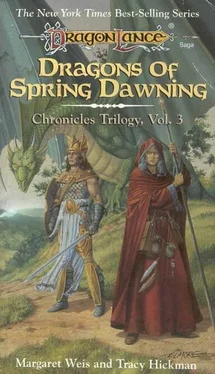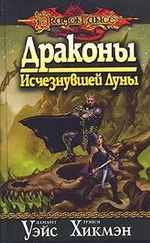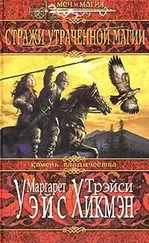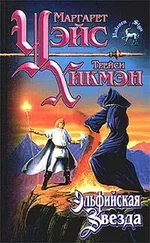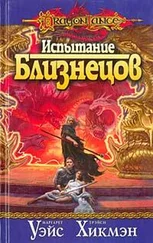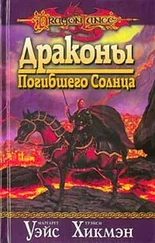Маргарет Уэйс - Dragons of Spring Dawning
Здесь есть возможность читать онлайн «Маргарет Уэйс - Dragons of Spring Dawning» весь текст электронной книги совершенно бесплатно (целиком полную версию без сокращений). В некоторых случаях можно слушать аудио, скачать через торрент в формате fb2 и присутствует краткое содержание. Год выпуска: 1985, Жанр: Фэнтези, на английском языке. Описание произведения, (предисловие) а так же отзывы посетителей доступны на портале библиотеки ЛибКат.
- Название:Dragons of Spring Dawning
- Автор:
- Жанр:
- Год:1985
- ISBN:нет данных
- Рейтинг книги:3 / 5. Голосов: 1
-
Избранное:Добавить в избранное
- Отзывы:
-
Ваша оценка:
- 60
- 1
- 2
- 3
- 4
- 5
Dragons of Spring Dawning: краткое содержание, описание и аннотация
Предлагаем к чтению аннотацию, описание, краткое содержание или предисловие (зависит от того, что написал сам автор книги «Dragons of Spring Dawning»). Если вы не нашли необходимую информацию о книге — напишите в комментариях, мы постараемся отыскать её.
Dragons of Spring Dawning — читать онлайн бесплатно полную книгу (весь текст) целиком
Ниже представлен текст книги, разбитый по страницам. Система сохранения места последней прочитанной страницы, позволяет с удобством читать онлайн бесплатно книгу «Dragons of Spring Dawning», без необходимости каждый раз заново искать на чём Вы остановились. Поставьте закладку, и сможете в любой момент перейти на страницу, на которой закончили чтение.
Интервал:
Закладка:
“And the day came when the populace rose against the magic-users. And for only the second time in the history of the Order, the Robes came together. The first time was during the creation of the dragon orbs, which contained the essences of good and evil, bound together by neutrality. After that, they went their separate ways. Now, allied by a common threat, they came together once more to protect their own.
“The magicians themselves destroyed two of the Towers, rather than let the mobs invade them and meddle with that which was beyond their understanding. The destruction of these two Towers laid waste to the countryside around them and frightened the Kingpriest—for there was a Tower of High Sorcery located in Istar and one in Palanthas. As for the third, in the Forest of Wayreth, few cared what became of it, for it was far from any center of civilization.
“And so the Kingpriest approached the magic-users with a show of piety. If they would leave the two Towers standing, he would let them withdraw in peace, removing their books and scrolls and magical implements to the Tower of High Sorcery in Wayreth. Sorrowfully the magic-users accepted his offer.”
“But why didn’t they fight?” Laurana interrupted. “I’ve seen Raistlin and... and Fizban when they’re angry! I can’t imagine what truly powerful wizards must be like!”
“Ah, but stop and consider this, Laurana. Your young friend—Raistlin—grew exhausted casting even a few relatively minor spells. And once a spell is cast, it is gone from his memory forever unless he reads his spellbook and studies it once more. This is true of even the highest level mages. It is how the gods protect us from those who might otherwise become too powerful and aspire to godhood itself. Wizards must sleep, they must be able to concentrate, and they must spend time in daily study. How could they withstand besieging mobs? And, too, how could they destroy their own people?
“No, they felt they had to accept the Kingpriest’s offer. Even the Black Robes, who cared little for the populace, saw that they must be defeated and that magic itself might be lost from the world. They withdrew from the Tower of High Sorcery at Istar—and almost immediately the Kingpriest moved in to occupy it. Then they abandoned the Tower here, in Palanthas. And the story of this Tower is a terrible one.”
Astinus, who had been relating this without expression in his voice, suddenly grew solemn, his face darkening.
“Well I remember that day,” he said, speaking more to himself than to those around the table. “They brought their books and scrolls to me, to be kept in my library. For there were many, many books and scrolls in the Tower, more than the magic-users could carry to Wayreth. They knew I would guard them and treasure them. Many of the spellbooks were ancient and could no longer be read, since they had been bound with spells of protection—spells to which the Key... had been lost. The Key...”
Astinus fell silent, pondering. Then, with a sigh, as if brushing away dark thoughts, he continued.
“The people of Palanthas gathered around the Tower as the highest of the Order—the Wizard of the White Robes—closed the Tower’s slender gates of gold and locked them with a silver key. The Lord of Palanthas watched him eagerly. All knew the Lord intended to move into the Tower, as his mentor—the Kingpriest of Istar—had done. His eyes lingered greedily on the Tower, for legends of the wonders within—both fair and evil—had spread throughout the land.”
“Of all the beautiful buildings in Palanthas,” murmured Lord Amothus, “the Tower of High Sorcery was said to be the most splendid. And now...”
“What happened?” asked Laurana, feeling chilled as the darkness of night crept through the room, wishing someone would summon the servants to light the candles.
“The Wizard started to hand the silver key to the Lord,” continued Astinus in a deep, sad voice. “Suddenly, one of the Black Robes appeared in a window in the upper stories. As the people stared at him in horror, he shouted, ‘The gates will remain closed and the halls empty until the day comes when the master of both the past and the present returns with power!’ Then the evil mage leaped out, hurling himself down upon the gates. And as the barbs of silver and of gold pierced the black robes, he cast a curse upon the Tower. His blood stained the ground, the silver and golden gates withered and twisted and turned to black. The shimmering tower of white and red faded to ice gray stone, its black minarets crumbled.
“The Lord and the people fled in terror and, to this day, no one dares approach the Tower of Palanthas. Not even kender"—Astinus smiled briefly—“who fear nothing in this world. The curse is so powerful it keeps away all mortals—”
“Until the master of past and present returns,” Laurana murmured.
“Bah! The man was mad.” Lord Amothus sniffed. “No man is master of past and present—unless it be you, Astinus.”
“I am not master!” Astinus said in such hollow, ringing tones that everyone in the room stared at him. “I remember the past, I record the present. I do not seek to dominate either!”
“Mad, like I said.” The Lord shrugged. “And now we are forced to endure an eyesore like the Tower because no one can stand to live around it or get close enough to tear it down.”
“I think to tear it down would be a shame,” Laurana said softly, gazing at the Tower through the window. “It belongs here. . . .”
“Indeed it does, young woman,” Astinus replied, regarding her strangely.
Night’s shadows had deepened as Astinus talked. Soon the Tower was shrouded in darkness while lights sparkled in the rest of the city. Palanthas seemed to be trying to out—glitter the stars, thought Laurana, but a round patch of blackness will remain always in its center.
“How sad and how tragic,” she murmured, feeling that she must say something, since Astinus was staring straight at her. “And that—that dark thing I saw fluttering, pinned to the fence—” She stopped in horror.
“Mad, mad,” repeated Lord Amothus gloomily. “Yes, that is what’s left of the body, so we suppose. No one has been able to get close enough to find out.”
Laurana shuddered. Putting her hands to her aching head, she knew that this grim story would haunt her for nights, and she wished she’d never heard it. Bound up in her destiny! Angrily she put the thought out of her mind. It didn’t matter. She didn’t have time for this. Her destiny looked bleak enough without adding nightmarish nursery tales.
As if reading her thoughts, Astinus suddenly rose to his feet and called for more light.
“For,” he said coldly, staring at Laurana, “the past is lost. Your future is your own. And we have a great deal of work to do before morning.”
Commander of the knights of Solamnia stood, “First, I must read a communique I received from Lord Gunthar only a few hours ago.” The Lord of Palanthas withdrew a scroll from the folds of his finely woven, woolen robes and spread it on the table, smoothing it carefully with his hands. Leaning his head back, he peered at it, obviously trying to bring it into focus.
Laurana—feeling certain that this must be in reply to a message of her own she had prompted Lord Amothus to send to Lord Gunthar two days earlier—bit her lip in impatience.
“It’s creased,” Lord Amothus said in apology. “The griffons the elven lords have so kindly loaned us"—he bowed to Laurana, who bowed back, suppressing the urge to rip the message from his hand—"cannot be taught to carry these scrolls without rumpling them. Ah, now I can make it out. ‘Lord Gunthar to Amothus, Lord of Palanthas. Greetings.’ Charming man. Lord Gunthar.” The Lord looked up. “He was here only last year, during Spring Dawning festival—which, by the way, takes place in three weeks, my dear. Perhaps you would grace our festivities—”
Читать дальшеИнтервал:
Закладка:
Похожие книги на «Dragons of Spring Dawning»
Представляем Вашему вниманию похожие книги на «Dragons of Spring Dawning» списком для выбора. Мы отобрали схожую по названию и смыслу литературу в надежде предоставить читателям больше вариантов отыскать новые, интересные, ещё непрочитанные произведения.
Обсуждение, отзывы о книге «Dragons of Spring Dawning» и просто собственные мнения читателей. Оставьте ваши комментарии, напишите, что Вы думаете о произведении, его смысле или главных героях. Укажите что конкретно понравилось, а что нет, и почему Вы так считаете.
